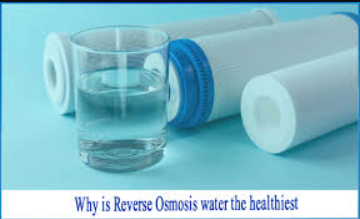
Chemically pure H2O has never been present in the water we drink throughout human history. Reverse osmosis water includes trace amounts of organic matter and minerals, some of which are harmful to us, but others of which are essential for good health.
The World Health Organization (WHO) suggests adding 10 mg/L of magnesium, 100 mg/L of dissolved salts, 30 mg/L of calcium, and 30 mg/L of bicarbonate ion to drinking water. Consider purchasing a RO (Reverse Osmosis) water filter.
Want to know Is drinking water from a RO filter healthy? In this post, we outline the fundamentals of RO filters, and answer the most frequent question asked i.e. is it healthy to drink RO water or not
Reverse osmosis: What is it?
Initially, the method was created as a means of desalinating brackish or seawater to make it drinkable. Especially particular chemical pollutants, such heavy metals, should be reduced Water pressure is used in the reverse osmosis process to force tap water across a semipermeable membrane, which prevents bigger molecules like those found in dissolved minerals (such as salt) from passing through. The procedure allows for the separation of the clean tap water from any other impurities in the water.
What is removed by reverse osmosis filters?
Water pollutants such as bacteria, nitrates, viruses, sulphates, fluoride, arsenic, and many more are removed from water using RO systems. However, they also eliminate beneficial minerals including salt, calcium, potassium, and magnesium. With an overall filtration effectiveness rate of 99% or greater, RO filters can eliminate hundreds of contaminants from tap water. Even 99.99% is claimed by some high pressure professional RO filters, like Blue Water.
On the other hand, cheap RO filters often have a substantially lower efficiency. Therefore, it’s crucial that you check the certifications and independent lab testing of each individual brand and product. RO does not effectively remove chlorine or soften water. As a result, RO is virtually usually combined with activated carbon filters. In addition, the activated carbon aids in the removal of 70+ more toxins, including pesticides, , bi-products of chlorine, herbicides medicines, and more.
Does getting clean drinking water at home require a RO filter?
The sole option for domestic drinking water during the past 10-15 years has been advertised as RO systems in combination with activated carbon. Homes can occasionally gain a lot from RO filters. Check the quality of your neighbourhood tap water and what is necessary to make it safe and delicious before investing in a RO unit or any other water treatment equipment. Don’t pay attention to the salesman.
What benefits (pros) come with RO filters?
A tested method for producing clean drinking water
High-quality bacteria-filtering technology for non-potable tap water
May make drinking water from tap with a TDS of 1500 or higher possible.
What RO filtration’s drawbacks (cons) are there?
Produces up to 6 times as much waste water as clean water (some products are much more efficient)
Need expert upkeep to maintain efficiency and security
If water isn’t remineralized, it could taste flat and make coffee and tea taste worse.
Removes beneficial minerals such bicarbonates, magnesium, calcium, and potassium
Quite pricey beginning plus repairs and replacements
Since the chlorine has been eliminated, there is a chance that bacteria will develop in the water following the filtration.
Is reverse osmosis-filtered water that has been demineralized healthy for you?
Actually, it’s not, however. Reverse osmosis or distillation-produced drinking water with low mineral content (TDS) is not recommended for long-term human consumption and may even have harmful effects on a person’s health. For many people, this deficiency in nutrients may also affect the taste badly.
Drinking demineralized water won’t cause you any problems if you maintain a healthy diet because the minerals in tap water are not essential for your health.
Conclusion:
- A remarkable technological advancement known as reverse osmosis allows for the industrial treatment of polluted waste water and the provision of fresh water from sea water in places of the world where water is scarce. When the need calls for it, it might also be a suitable option for clean household water.
- Installing a RO filter won’t assure that your water is safe to drink, so only do it if you really need to.
- There are excellent alternatives to using public tap water, which are easy to install, reasonably priced, and sustainable.
- An Ultrafiltration filter might be a fantastic solution for unclean well water and public tap water.
Why Netsol!
Netsol is a one-stop shop for designing and building an affordable, useful, and sustainable reverse osmosis system and a water treatment plant.
When it comes to idea generation, engineering, design, advising, and technical help, you are working with the Best-In-The-Business seven days a week. Contact us at enquiry@netsolwater.com or by phone at +91-9650608473 for any more assistance, questions, or product orders.
